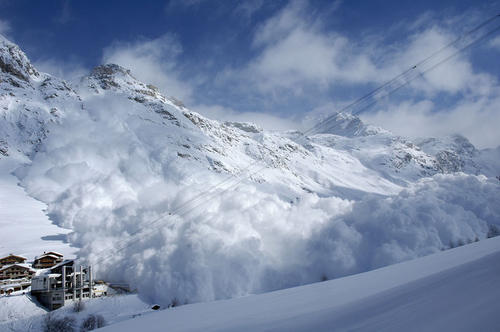The Lure of the Mountains
Scholars at Freie Universität study the causes of natural disasters in the Alps
Apr 02, 2012
Scholars at Freie Universität are studying the causes of natural disasters in the Alps.
Image Credit: Eric Bargis / Fotolia fotolia.com
When the local population first converted to Christianity, the old stories in which a giant lives up on the mountain and throws stones when he is angered seemed to fade away. Then, with the advent of the Enlightenment, the stories that claimed that landslides that swallowed whole villages were God’s punishment for a sinful life met a similar fate. Instead, scientific explanations holding that avalanches, falling rock, and landslides have geological, meteorological, or agricultural causes gained ground in the Alps, as in other areas. But each step forward also meant that a piece of longstanding traditional knowledge was lost – knowledge that by now, as the world is faced with climate change, could be very useful again. How and why that happened, and how helpful, but buried knowledge can be dug up and made useful again, are the subjects of study for scholars taking part in the project “Alpine Natural Disasters in Climate Change,” a large portion of which is located at Freie Universität.
“The core of our research has to do with patterns of interpretation and practices of action in the Alps since the 18th century,” says Undine Frömming, a junior professor at the Institute of Social and Cultural Anthropology and head of two subprojects. Four universities in all are involved in the project, which is being financed with 800,000 euros in funding by the German Federal Ministry of Education and Research, including the Chair of Forest and Environmental Policy at Technische Universität München (TUM), the Department of Medieval and Modern History at the University of Göttingen, and the Swiss Federal Institute for Forest, Snow and Landscape Research (WSL). Since the Disaster Research Unit at the University of Kiel became affiliated with the Department of Political and Social Sciences at Freie Universität Berlin, bringing its director, Martin Voss, to Freie Universität as a visiting professor, the majority of the research project is being headed from Berlin.
A social and cultural anthropologist on an Alpine field, scythe in hand, is something you don’t see every day. For Christian Reichel, who has taken on the empirical subproject, though, that very thing is now part of everyday life: Reichel, a doctoral candidate, has traveled to the Swiss valley of Safiental for his research. On site, he not only asks local farmers about the knowledge that has been handed down regarding natural disasters, but also records it, having the farmers enter avalanche courses and other dangerous areas on a map of the valley. His goal is also to film the interviews with local residents and link the recordings with an interactive map at the end of the project. During his months of field research on the farms, Reichel pitches in – “so that I’m not seen as a jet-setting social and cultural anthropologist,” he says, and also to get closer to those who have the knowledge, passed down from past generations, that he is looking for. The approach is apparently a success: He has been received openly, Reichel says, with locals happy to give interviews and very pleased that someone is interested in their knowledge, some of which stretches back centuries.
At the end of the project, these “local knowledge strategies” are supposed to supplement the existing approach to natural disaster management in Switzerland, which has thus far focused exclusively on technology and the natural sciences. The ultimate goal is to be better able to prevent natural disasters in the future. “I am also interested in how climate-related natural disasters are perceived locally, and whether those perceptions affect political decisions,” Reichel says. In the best case, the outcome would be locally coordinated disaster and environmental protection plans that take longstanding knowledge into account and are thus better accepted by local farmers.
Josef Bordat is studying the topic on a more theoretical level. His subproject is entitled “From Theodicy to Technodicy to Anthropodicy”: From a view of natural disasters centered in the divine, such as that still in place during the 18th century (theodicy), philosopher Bordat wishes to traverse the current perspective, with its heavy emphasis on technology (technodicy) and arrive at a possible future view that places people at the forefront (anthropodicy). To that end, Bordat hopes to trace the changes that have occurred in the interpretation of these kinds of disasters and understand them from a theoretical standpoint. The final result could be a local ethics of climate that reconciles academia and natural philosophy. “Climate change is a big topic in this context, since it points out the lost model of relationships with nature that still exists in many other cultures,” says Frömming. By gathering this knowledge, the scholars hope not only to safeguard it for the future, but also to put it to work in managing present-day natural disasters as well.
Further Information
-
Junior Professor Urte Undine Frömming, Institute of Social and Cultural Anthropology, Freie Universität Berlin, Tel.: +49 (0)30 838-56865, Email: u.froemming@fu-berlin.de
-
Christian Reichel, M.A., Institute of Social and Cultural Anthropology, Freie Universität Berlin, Email: hcreichel@googlemail.com
-
Dr. Josef Bordat, Institute of Social and Cultural Anthropology, Freie Universität Berlin, Email: josef_bordat@hotmail.com

